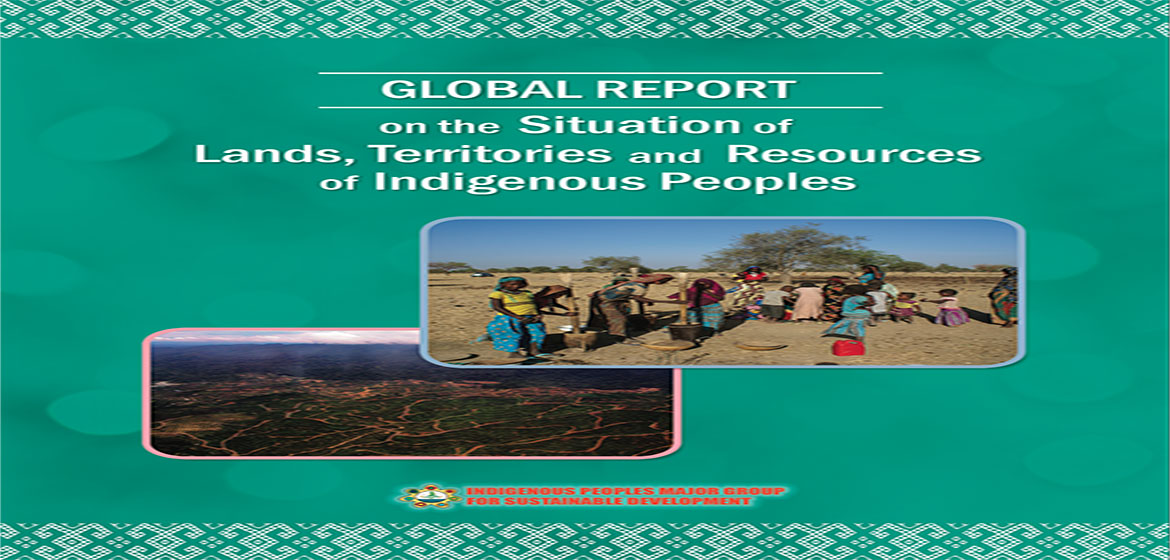The report on the current state of Indigenous Peoples’ Lands, Territories and Resources (LTR) was prepared by the Indigenous Peoples Major Group (IPMG) to inform the implementation of global commitments to Sustainable Development and the various related processes for transformational change. It is a summary of regional reports written by indigenous researchers and experts under the guidance of the IPMG Global Coordinating Committee to stress the importance of securing the collective land rights of indigenous peoples, an imperative to achieve sustainable development for all.
Indigenous peoples’ intrinsic and reciprocal relationships with their land, territories and resources constitute the foundation of their identities and cultures, spirituality and values, health and collective well-being. Springing from these relationships with their homelands are their diverse contributions towards enriching nature, engendering diversity and maintaining balance with the natural world. Securing, renewing and nurturing these relationships with their lands, territories and resources amid unsustainable production and consumption, extractive industries and carbon-based development, marked by highly unequal power relations and social inequality, is the challenge indigenous peoples face around the world.
The legacy of 500 years of colonialism and its institutional framework of political and cultural discrimination, environmental destruction, economic marginalization and impoverishment persists in modern-day States. Indigenous peoples’ lands, territories and resources were forcibly taken, exploited, divided and expropriated in the name of development. Dismantling this legacy by upholding the rights of indigenous peoples has been the challenge posed to the global community for more than 30 years of engagement with the UN system. As a result, the UN General Assembly in 2007 adopted the UN Declaration on the Rights of Indigenous Peoples (UNDRIP). In 2014 at the World Conference on Indigenous Peoples (WCIP), States reaffirmed their commitment to respect, promote, advance and in no way diminish the rights of indigenous peoples set forth in the UNDRIP.
As a result, the UN General Assembly in 2007 adopted the UN Declaration on the Rights of Indigenous Peoples (UNDRIP). In 2014 at the World Conference on Indigenous Peoples (WCIP), States reaffirmed their commitment to respect, promote, advance and in no way diminish the rights of indigenous peoples set forth in the UNDRIP.
Hundreds of recommendations and advice issued by the UN Permanent Forum on Indigenous Issues, the Expert Mechanism on the Rights of Indigenous Peoples and the Special Rapporteur on the Rights of Indigenous Peoples also emphasize the urgent need to recognize and protect the collective rights of indigenous peoples over their lands, territories and resources in response to the worsening condition of indigenous peoples across the globe.
These UN General Assembly resolutions on indigenous peoples, along with the 2030 Agenda on Sustainable Development, constitute a strong political foundation and mandate – that include human rights obligations - for States to work in partnership with indigenous peoples to overcome inequality gaps and being left behind. At the WCIP, States made this commitment:
“We commit to establish at the national level, in conjunction with indigenous peoples concerned, fair, independent, impartial, open and transparent mechanisms to acknowledge, advance and adjudicate the rights of indigenous peoples pertaining to lands, territories and resources. Such mechanisms will be culturally appropriate and flexible, and competent to safeguard free, prior and informed consent by indigenous peoples prior to development or use of lands, territories and resources.
We commit to address the impact or potential impact of major development projects, including extractive industries, on indigenous peoples and to ensure transparency and benefit sharing. The rights of indigenous peoples regarding development of lands, territories and resources, will be incorporated into law, policies and practice.
We commit to develop, in conjunction with indigenous peoples concerned, policies, programmes and resources to support indigenous peoples’ occupations, economies, livelihoods, seeds, and food security.”
For in truth, indigenous peoples are contributing immensely in addressing the current crises of biodiversity loss and climate change mitigation and adaptation. They offer diverse and innovative solutions to these problems which they encounter daily on the ground. Their simple lifestyles and sustainable systems of resource governance and management are also invaluable in achieving sustainable development in an integrated and cohesive manner.
For their contributions to be fully realized, indigenous peoples need secure tenure over their lands, territories and resources, to freely determine their development paths and priorities consistent with self-determination, and full respect for and exercise of their collective and individual human rights. This should be a centerpiece of development strategies that will not only benefit indigenous peoples but all of humanity and the planet.
This report presents stories from around the world about how indigenous peoples are facing contemporary challenges and contributing to sustainable development. We hope it will spur more attention and actions by decision makers and development actors at the national, regional and global levels on the centrality of securing the lands, territories and resources of indigenous peoples, if we are to save the only planet we all depend on.
Joan Carling
Co-convenor
Indigenous Peoples Major Group for the SDGs



